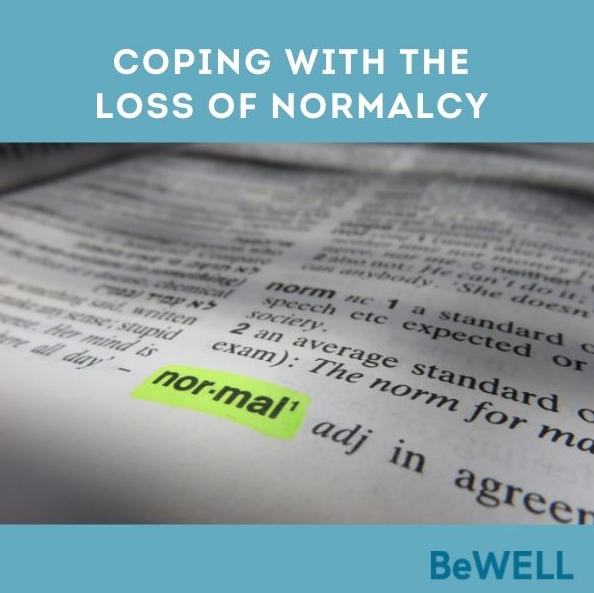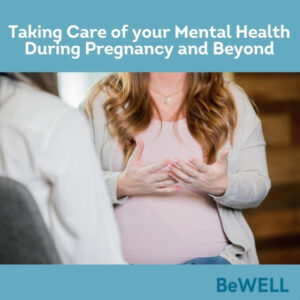Coping with the Loss of Normalcy
If you are a living, breathing human being, chances are you have been impacted in some way by the ongoing global pandemic, COVID-19. Whether it has been an emotional impact, social impact, career impact, or physical impact, most people have come out of this pandemic very differently than when they entered it. Everyone’s lives were completely uprooted, shifted, and flipped upside down. With all of this change and uncertainty, there was no time to process our feelings. We were simply in survival mode. While we can acknowledge that gratitude and optimism are helpful tools in coping with the stress of COVID-19, are we allowing space for our feelings of loss and disappointment? I don’t just mean loss of loved ones or loss of a job, which are both incredibly devastating circumstances. I mean loss of time, loss of certainty, loss of innocence. Have we allowed ourselves to grieve these losses?
For many, COVID has taken, and continues to take, a lot from us. Whether it be the loss of a once-in-a-lifetime event, such as graduation or a wedding, or loss of time with loved ones, no one has been left completely unscathed by the impacts of COVID. After speaking to many people in their mid-20’s, a common theme is feeling “behind” after the pandemic. They explain that they envisioned themselves much further along in their life than where they currently stand. For some, there was an expectation that they would be in a romantic relationship and on the path to marriage at this point. For some, there was an expectation that they would be working at a higher level at their company. COVID has forced many of us to completely let go of where we had “hoped we might be” at this point in our life and move to “where we currently are due to circumstances outside our control.”
I often share a quote by Nedra Tawwab with my clients: “You have changed, but your rules haven’t. You are still operating by a set of rules that serve a different version of yourself”. Tawwab reminds us that we can’t force ourselves to fit into a box that no longer fits. We are not the same individuals that we were before March 2020, so we cannot expect ourselves to operate in the same way.
Many of my clients have described feeling frustrated and confused by their inability to perform tasks at work at the same level they used to. I remind them that each day of this pandemic, we have been operating in survival mode. Remaining in survival mode for an extended period of time drains us and can cause detrimental effects to our physical and mental health. Knowing this, how could we possibly expect one to deliver the same level of work in the same period of time that we did pre-pandemic? We have to adjust our expectations of both ourselves and others. This may mean letting go of the expectation that you would be married with a child by age 30. Or the expectation that you can go out to dinner with friends five nights a week and not be completely exhausted afterwards. Or the expectation that you can achieve straight A’s every semester. These expectations may be unrealistic for us right now.
So what is the solution? Force ourselves into that same tiny box that we neatly fit into in February 2020? Well, not exactly.
First
We must accept what we have lost. We cannot change that the entire world was flipped upside down. This may have resulted in us losing out on things that feel really important to us. However, acceptance does NOT mean resignation. Meaning, just because we accept that this occurred does not mean that we have to be okay with it and slap a smile on our face. It simply means that we recognize that this was completely out of our control. We should resist trying to convince ourselves that we can change what happened.
Second
Allow ourselves to grieve what we have lost. For instance, grieving a wedding that was canceled or postponed may feel strange, but this is a valid, legitimate loss. We are allowed to feel devastated by this. Be mindful not to compare your grief with the grief of others. Everything is relative and everyone has different perspectives.
Third
Meet yourself where you are with compassion. You have gone through a lot these past two years, and you may be really struggling at the moment. That is okay. Identify where it hurts and how it hurts. Then, acknowledge your pain with kindness and gentleness. The last step is to shift what future planning looks like for you. Knowing what we know now about losses and lack of control, how do we set goals and allow ourselves to hope for the future? Provide yourself with flexibility when setting these goals. View them more as suggestions or “nice-to-have’s” as opposed to hard and fast rules. These past few years have been extremely challenging. Take care of yourself, reach out for help if you need it, and remember to be gentle with yourself!



